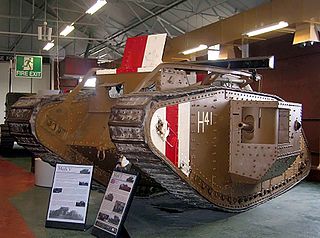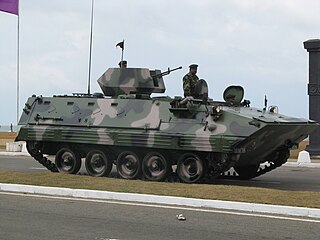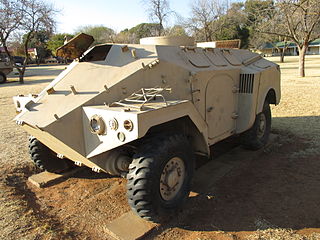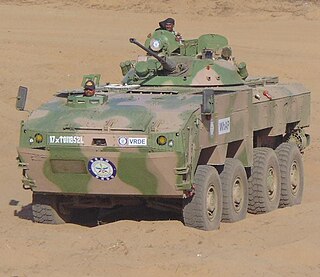
An armoured fighting vehicle or armored fighting vehicle (AFV) is an armed combat vehicle protected by armour, generally combining operational mobility with offensive and defensive capabilities. AFVs can be wheeled or tracked. Examples of AFVs are tanks, armoured cars, assault guns, self-propelled artilleries, infantry fighting vehicles (IFV), and armoured personnel carriers (APC).

The M113 is a fully tracked armored personnel carrier (APC) that was developed and produced by the FMC Corporation. The M113 was sent to United States Army Europe in 1961 to replace the mechanized infantry's M59 APCs. The M113 was first used in combat in April 1962 after the United States provided the South Vietnamese army (ARVN) with heavy weaponry such as the M113, under the Military Assistance Command, Vietnam (MACV) program. Eventually, the M113 was the most widely used armored vehicle of the U.S. Army in the Vietnam War and was used to break through heavy thickets in the midst of the jungle to attack and overrun enemy positions. It was largely known as an "APC" or an "ACAV" by the allied forces.

The Véhicule de l'Avant Blindé or VAB is a French armoured personnel carrier and support vehicle designed and manufactured by Renault Trucks Defense. It entered French service in 1979 and around 5,000 were produced for the French Army as well as for export. It has seen combat in various conflicts in Africa, Asia as well as Europe and has also been exported to more than 15 countries.

The FV432 is the armoured personnel carrier variant in the British Army's FV430 series of armoured fighting vehicles. Since its introduction in the 1960s, it has been the most common variant, being used for transporting infantry on the battlefield. At its peak in the 1980s, almost 2,500 vehicles were in use.

A Kangaroo was a Canadian armoured personnel carrier (APC) during the Second World War which was created by converting a tank chassis. Kangaroos were created as an expedient measure "in the field" by the Canadian Army, and were so successful that they were used by other Commonwealth forces, including the British Army.

Heavy Industries Taxila, is a state-owned enterprise and a defense contractor located in Taxila, Punjab, Pakistan.

The ASCOD armoured fighting vehicle family is the product of a cooperation agreement between Austrian Steyr-Daimler-Puch AG and Spanish General Dynamics Santa Bárbara Sistemas. Both companies are now divisions of a unit of General Dynamics. The ASCOD family includes the LT 105 light tank equipped with a 105 mm gun, a surface-to-air missile launcher, an anti-tank guided missile launcher, mortar carrier, R&R vehicle, command-and-control vehicle, ambulance, artillery observer, and the AIFV model.

The AIFV is an American tracked light armored vehicle that serves as an infantry fighting vehicle (IFV) in the armies of several countries. It is a development of the M113A1 armored personnel carrier.
A huge number of M113 armored personnel carrier variants have been created, ranging from infantry carriers to nuclear missile carriers. The M113 armored personnel carrier has become one of the most prolific armored vehicles of the second half of the 20th century, and continues to serve with armies around the world in many roles.

The Type 63 is a Chinese armoured personnel carrier that entered service in the late 1960s. It was the first armoured vehicle designed in China without Soviet assistance. The design is simple and is comparable to other APCs of its time such as the M113.

The Dragoon 300 AFV was produced by Arrowpointe Corporation during the 1980s. It was based on the automotive components of the United States Army's M113 APCs and 5-ton trucks. It resembles a larger V-150 Commando.

The NM135 Stormpanservogn is a Norwegian tracked light armoured vehicle (LAV). It is variant of the American M113 armoured personnel carrier (APC), armed with a 20mm cannon in a rotating turret.

The Norinco Type 89 tracked armoured fighting vehicle is a Chinese armoured personnel carrier. It was developed from the earlier export market Type 85 AFV vehicle. It entered service in the late 1990s and was first shown publicly in 1999. There are approximately 1,000 in service. It has the industrial index of WZ534 and although it was mainly developed for the PLA, there is also an export version YW534.

The Panhard M3 VTT is an amphibious armoured personnel carrier. Developed as a private venture for the export market, the M3 was built with the same mechanical and chassis components as the Panhard AML range of light armoured cars. The two vehicle types share a 95% interchangeability of automotive parts. The M3 is an extremely versatile design which can be configured for a wide variety of auxiliary battlefield roles. The most popular variants of the base personnel carrier included an armoured ambulance, a mobile command post, and an internal security vehicle. It could also be fitted with a wide variety of turrets and armament, ranging from a single general-purpose machine gun to medium calibre autocannon.

The Fahd is a 4x4 Egyptian armored personnel carrier, designed to fit the requirements of the Egyptian Military. It replaced older APCs in Egyptian service such as the BTR-40, and the Walid. It has been used by the United Nations.

The TATA Kestrel, also known as the IPMV , a variant of DRDO developed WhAP, is a family of armoured personnel carriers developed by Tata Advanced Systems and the Defence Research and Development Organisation (DRDO). It was developed to replace Soviet-era BMP-1 and BMP-2 and APCs in service with the Indian Army.

Eitan is an armoured fighting vehicle (AFV) developed by the Merkava and Armoured Vehicles Directorate in the IMOD to replace the ageing M113 armoured personnel carrier in use by the Israel Defense Forces. Its armored personnel carrier (APC) variant lacks the Iron Fist APS, due to the fact those are not the serial production Eitan vehicles yet. The infantry fighting vehicle (IFV) variant is still not in service.

The CM-21 is a Taiwanese armored vehicle designed and manufactured by the Republic of China Armored Vehicle Development Center, based on the American M113 APC. The first prototype was manufactured in 1979, and the CM-21 officially entered service in 1982 and remains in use today, with over 1,000 units manufactured and a number of different variants.

The M113 armoured personnel carriers are American produced military vehicles that have operated in the Australian Army since 1964. An initial pair of M113s was purchased for trials purposes in 1962. Either 817 or 840 were acquired by 1979, comprising nine different variants. A long-running modernisation program that commenced in the 1990s resulted in 431 M113s being upgraded between 2007 and 2012. All of the upgraded M113s remain in service as of 2020.



















